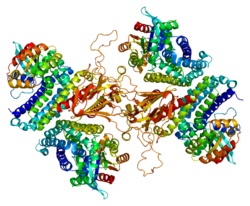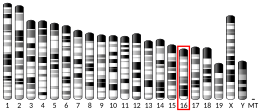T-cell lymphoma invasion and metastasis-inducing protein 1
T-cell lymphoma invasion and metastasis-inducing protein 1 is a protein that in humans is encoded by the TIAM1 gene.[4][5][6]
Structure[]
TIAM1 is tightly associate with BAIAP2 as a subunit. It contains one DH (DBL-homology) domain, one PDZ domain, two PH domains and one Ras-binding .
Function[]
TIAM1 modulates the activity of Rho GTP-binding proteins and connects extracellular signals to cytoskeletal activities. In addition, TIAM1 activates Rac1, CDC42, and to a lesser extent RhoA.
Clinical significance[]
TIAM1 is found in virtually all tumor cell lines examined including B- and T-lymphomas, neuroblastomas, melanomas and carcinomas.
Interactions[]
T-cell lymphoma invasion and metastasis-inducing protein 1 has been shown to interact with ANK1,[7] Myc,[8] RAC1[9][10] and PPP1R9B.[11]
Tiam1 interacts also with para-cingulin, that plays a role in recruiting Tiam1 to junctions and thus activate Rac1 at epithelial junctions.[12]
References[]
- ^ a b c GRCm38: Ensembl release 89: ENSMUSG00000002489 - Ensembl, May 2017
- ^ "Human PubMed Reference:". National Center for Biotechnology Information, U.S. National Library of Medicine.
- ^ "Mouse PubMed Reference:". National Center for Biotechnology Information, U.S. National Library of Medicine.
- ^ "Entrez Gene: TIAM1 T-cell lymphoma invasion and metastasis 1".
- ^ Chen H, Antonarakis SE (Nov 1995). "Localization of a human homolog of the mouse Tiam-1 gene to chromosome 21q22.1". Genomics. 30 (1): 123–127. doi:10.1006/geno.1995.0025. PMID 8595894.
- ^ Uhlenbrock K, Eberth A, Herbrand U, Daryab N, Stege P, Meier F, Friedl P, Collard JG, Ahmadian MR (Sep 2004). "The RacGEF Tiam1 inhibits migration and invasion of metastatic melanoma via a novel adhesive mechanism". Journal of Cell Science. 117 (Pt 20): 4863–4871. doi:10.1242/jcs.01367. PMID 15340013.
- ^ Bourguignon LY, Zhu H, Shao L, Chen YW (Jul 2000). "Ankyrin-Tiam1 interaction promotes Rac1 signaling and metastatic breast tumor cell invasion and migration". The Journal of Cell Biology. 150 (1): 177–191. doi:10.1083/jcb.150.1.177. PMC 2185563. PMID 10893266.
- ^ Otsuki Y, Tanaka M, Kamo T, Kitanaka C, Kuchino Y, Sugimura H (Feb 2003). "Guanine nucleotide exchange factor, Tiam1, directly binds to c-Myc and interferes with c-Myc-mediated apoptosis in rat-1 fibroblasts". The Journal of Biological Chemistry. 278 (7): 5132–5140. doi:10.1074/jbc.M206733200. PMID 12446731.
- ^ Worthylake DK, Rossman KL, Sondek J (Dec 2000). "Crystal structure of Rac1 in complex with the guanine nucleotide exchange region of Tiam1". Nature. 408 (6813): 682–688. Bibcode:2000Natur.408..682W. doi:10.1038/35047014. PMID 11130063. S2CID 4429919.
- ^ Gao Y, Xing J, Streuli M, Leto TL, Zheng Y (Dec 2001). "Trp(56) of rac1 specifies interaction with a subset of guanine nucleotide exchange factors". The Journal of Biological Chemistry. 276 (50): 47530–47541. doi:10.1074/jbc.M108865200. PMID 11595749.
- ^ Buchsbaum RJ, Connolly BA, Feig LA (May 2003). "Regulation of p70 S6 kinase by complex formation between the Rac guanine nucleotide exchange factor (Rac-GEF) Tiam1 and the scaffold spinophilin". The Journal of Biological Chemistry. 278 (21): 18833–18841. doi:10.1074/jbc.M207876200. PMID 12531897.
- ^ Guillemot L, Paschoud S, Jond L, Foglia A, Citi S (Oct 2008). "Paracingulin regulates the activity of Rac1 and RhoA GTPases by recruiting Tiam1 and GEF-H1 to epithelial junctions". Molecular Biology of the Cell. 19 (10): 4442–4453. doi:10.1091/mbc.E08-06-0558. PMC 2555940. PMID 18653465.
Further reading[]
- Habets GG, van der Kammen RA, Stam JC, Michiels F, Collard JG (Apr 1995). "Sequence of the human invasion-inducing TIAM1 gene, its conservation in evolution and its expression in tumor cell lines of different tissue origin". Oncogene. 10 (7): 1371–1376. PMID 7731688.
- Habets GG, van der Kammen RA, Jenkins NA, Gilbert DJ, Copeland NG, Hagemeijer A, Collard JG (1995). "The invasion-inducing TIAM1 gene maps to human chromosome band 21q22 and mouse chromosome 16". Cytogenetics and Cell Genetics. 70 (1–2): 48–51. doi:10.1159/000133989. PMID 7736788.
- Michiels F, Habets GG, Stam JC, van der Kammen RA, Collard JG (May 1995). "A role for Rac in Tiam1-induced membrane ruffling and invasion". Nature. 375 (6529): 338–340. Bibcode:1995Natur.375..338M. doi:10.1038/375338a0. PMID 7753201. S2CID 4251212.
- Andersson B, Wentland MA, Ricafrente JY, Liu W, Gibbs RA (Apr 1996). "A "double adaptor" method for improved shotgun library construction". Analytical Biochemistry. 236 (1): 107–113. doi:10.1006/abio.1996.0138. PMID 8619474.
- Michiels F, Stam JC, Hordijk PL, van der Kammen RA, Ruuls-Van Stalle L, Feltkamp CA, Collard JG (Apr 1997). "Regulated membrane localization of Tiam1, mediated by the NH2-terminal pleckstrin homology domain, is required for Rac-dependent membrane ruffling and C-Jun NH2-terminal kinase activation". The Journal of Cell Biology. 137 (2): 387–398. doi:10.1083/jcb.137.2.387. PMC 2139766. PMID 9128250.
- Fleming IN, Elliott CM, Buchanan FG, Downes CP, Exton JH (Apr 1999). "Ca2+/calmodulin-dependent protein kinase II regulates Tiam1 by reversible protein phosphorylation". The Journal of Biological Chemistry. 274 (18): 12753–12758. doi:10.1074/jbc.274.18.12753. PMID 10212259.
- Bourguignon LY, Zhu H, Shao L, Chen YW (Jan 2000). "CD44 interaction with tiam1 promotes Rac1 signaling and hyaluronic acid-mediated breast tumor cell migration". The Journal of Biological Chemistry. 275 (3): 1829–1838. doi:10.1074/jbc.275.3.1829. PMID 10636882.
- Crompton AM, Foley LH, Wood A, Roscoe W, Stokoe D, McCormick F, Symons M, Bollag G (Aug 2000). "Regulation of Tiam1 nucleotide exchange activity by pleckstrin domain binding ligands". The Journal of Biological Chemistry. 275 (33): 25751–25759. doi:10.1074/jbc.M002050200. PMID 10835422.
- Bourguignon LY, Zhu H, Shao L, Chen YW (Jul 2000). "Ankyrin-Tiam1 interaction promotes Rac1 signaling and metastatic breast tumor cell invasion and migration". The Journal of Cell Biology. 150 (1): 177–191. doi:10.1083/jcb.150.1.177. PMC 2185563. PMID 10893266.
- Worthylake DK, Rossman KL, Sondek J (Dec 2000). "Crystal structure of Rac1 in complex with the guanine nucleotide exchange region of Tiam1". Nature. 408 (6813): 682–688. Bibcode:2000Natur.408..682W. doi:10.1038/35047014. PMID 11130063. S2CID 4429919.
- Otsuki Y, Tanaka M, Yoshii S, Kawazoe N, Nakaya K, Sugimura H (Apr 2001). "Tumor metastasis suppressor nm23H1 regulates Rac1 GTPase by interaction with Tiam1". Proceedings of the National Academy of Sciences of the United States of America. 98 (8): 4385–4390. Bibcode:2001PNAS...98.4385O. doi:10.1073/pnas.071411598. PMC 31844. PMID 11274357.
- Gao Y, Xing J, Streuli M, Leto TL, Zheng Y (Dec 2001). "Trp(56) of rac1 specifies interaction with a subset of guanine nucleotide exchange factors". The Journal of Biological Chemistry. 276 (50): 47530–47541. doi:10.1074/jbc.M108865200. PMID 11595749.
- Buchsbaum RJ, Connolly BA, Feig LA (Jun 2002). "Interaction of Rac exchange factors Tiam1 and Ras-GRF1 with a scaffold for the p38 mitogen-activated protein kinase cascade". Molecular and Cellular Biology. 22 (12): 4073–4085. doi:10.1128/MCB.22.12.4073-4085.2002. PMC 133864. PMID 12024021.
- Lambert JM, Lambert QT, Reuther GW, Malliri A, Siderovski DP, Sondek J, Collard JG, Der CJ (Aug 2002). "Tiam1 mediates Ras activation of Rac by a PI(3)K-independent mechanism". Nature Cell Biology. 4 (8): 621–625. doi:10.1038/ncb833. PMID 12134164. S2CID 21639425.
- Wennerberg K, Ellerbroek SM, Liu RY, Karnoub AE, Burridge K, Der CJ (Dec 2002). "RhoG signals in parallel with Rac1 and Cdc42". The Journal of Biological Chemistry. 277 (49): 47810–47817. doi:10.1074/jbc.M203816200. PMID 12376551.
- Otsuki Y, Tanaka M, Kamo T, Kitanaka C, Kuchino Y, Sugimura H (Feb 2003). "Guanine nucleotide exchange factor, Tiam1, directly binds to c-Myc and interferes with c-Myc-mediated apoptosis in rat-1 fibroblasts". The Journal of Biological Chemistry. 278 (7): 5132–5140. doi:10.1074/jbc.M206733200. PMID 12446731.
- Buchsbaum RJ, Connolly BA, Feig LA (May 2003). "Regulation of p70 S6 kinase by complex formation between the Rac guanine nucleotide exchange factor (Rac-GEF) Tiam1 and the scaffold spinophilin". The Journal of Biological Chemistry. 278 (21): 18833–18841. doi:10.1074/jbc.M207876200. PMID 12531897.
- Genes on human chromosome
- Peripheral membrane proteins






